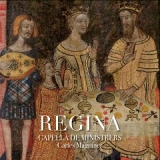Mit dem Album ‘Regina, 18 monarques medievals de la Corona d’Aragó’ veröffentlicht die Capella de Ministrers unter der Leitung von Carles Magraner Musik zum Thema « Einflussreiche Frauen, die vom Anfang des 13. bis zum 16. Jahrhundert Königinnen von Aragonien waren ».
Die Krone von Aragonien existierte mehr als fünfeinhalb Jahrhunderte lang, von 1164 bis 1716, aber sie hatte nie eine Titularkönigin, sie waren alle Gemahlinnen, sagt der Historiker Vicent Baydal im Booklet, der ihren « enormen Einfluss, ihre Macht und ihre herausragende Rolle in der Entwicklung von Gesellschaft, Politik und Kultur über Jahrhunderte hinweg » hervorhebt.
Die Aufnahme enthält 18 Werke von Autoren wie Adam de la Halle, Walther von der Vogelweide, Guillaume de Machaut, Jacopo da Bologna, Pere Oriola, Juan del Encina und Lluís del Milà sowie verschiedene anonyme Stücke. Es ist höfische Musik, mal zärtlich und intimistisch, mal tänzerisch.
Das Ensemble besteht aus den Sängerinnen Elia Casanova und Beatriz Lafont, deren feine Darbietungen eine wahre Freude sind. Die sechs Instrumentalisten spielen Flöten, Schalmei, Dudelsack, Vihuela, Laute, Zither, Gitarre, Harfe, Hackbrett sowie diverses Schlagzeug. Ihre Interpretationen sind stilvoll und musikalisch, ob sie die Sänger begleiten oder reine Instrumentalstücke spielen.
Was mir bei der Capella de Ministrers immer wieder auffällt, ist, wie einfühlsam Stimmungen erzeugt werden. Manche Stücke sind von eindringlicher Nachdenklichkeit oder melancholisch, andere einfach berührend charmant. Die Technik, die das Ensemble perfekt beherrscht, ist immer nur Mittel zum Zweck, nämlich Gefühle zu transportieren.
With the album ‘Regina, 18 monarques medievals de la Corona d’Aragó’, the Capella de Ministrers, directed by Carles Magraner, releases music on the theme of « Influential women who were queens of Aragon from the beginning of the 13th century to the 16th century ».
The Crown of Aragon existed for more than five and a half centuries, from 1164 to 1716, but it never had a titular queen; they were all consorts, says historian Vicent Baydal in the booklet, which highlights their « enormous influence, power and prominent role in the development of society, politics and culture over the centuries. »
The recording includes 18 works by authors such as Adam de la Halle, Walther von der Vogelweide, Guillaume de Machaut, Jacopo da Bologna, Pere Oriola, Juan del Encina and Lluís del Milà, as well as several anonymous pieces. It is courtly music, sometimes tender and intimate, sometimes dance-like.
The ensemble is made up of singers Elia Casanova and Beatriz Lafont, whose fine performances are a real joy. The six instrumentalists play flutes, shawms, bagpipes, vihuelas, lute, zither, guitar, harp, dulcimer, and various percussion instruments. Their interpretations are stylish and musical, whether they accompany the singers or play pure instrumental pieces.
What always strikes me about Capella de Ministrers is how sensitively moods are created. Some pieces are hauntingly pensive or melancholy, others simply touchingly charming. The technique, which the ensemble masters perfectly, is always only a means to an end, namely to transport feelings.






















